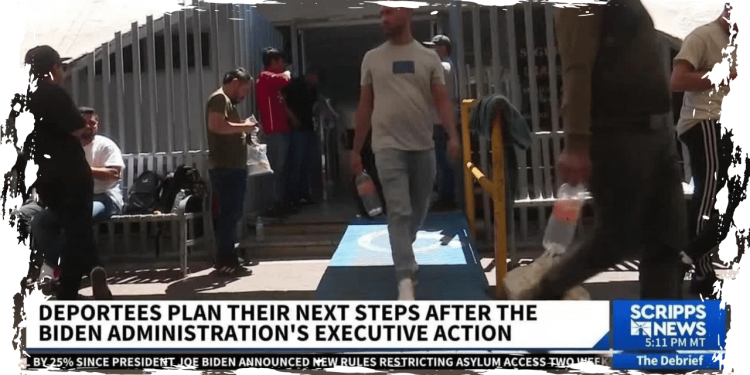Every day, numerous families with young children are escorted back to Mexico once they disembark from US government buses in Nogales, Arizona.
President Joe Biden’s new asylum policy has led to a surge in deportations.
As a result of the recent modification, certain asylum seekers who have crossed the border unlawfully are promptly returned to Mexico.
Since the implementation of the policy in early June, there has been a significant drop of 25% in apprehensions, according to a spokesperson from Arizona Customs and Border Patrol.
In Nogales, Arizona, the streets bear witness to a heartbreaking human story. Tears are a common sight as many people express that their American dreams have come to an abrupt end.
All of their belongings are crammed into plastic bags, and they must re-lace their shoes upon release from custody. Border guards confiscate shoelaces upon arrest, citing their potential use as a weapon while in custody.
Everyone is currently grappling with the question of what to do next.
Sitting on a bench with her daughter, Corina, a migrant woman, expressed her relief, “We made it here. I have two options now- either to take the discounted bus or stay in a shelter.”
According to border volunteers in Tucson, deportations have been a long-standing practice. However, they believe that the recent removals, which do not provide any opportunity for an asylum hearing, signify a significant shift in U.S. policy.
Carolina Pena, a volunteer, expressed her concern about the lack of opportunity for individuals to prove their credible fear. She stated, “These people have credible fear, and they’re not given an opportunity to prove that, and that to me is cruel.”
During an interview with Scripps News Tucson, Graciela, a migrant mother, disclosed the deportation papers she had signed. According to the papers, if she is caught re-entering the United States, she could face up to eight years in prison.
As deportations continue to escalate, there has been a noticeable surge in the number of individuals seeking assistance at various shelters.
Sister Lika Macias, stationed at a migrant shelter near the port, provides a safe haven for individuals from different corners of the globe. In addition to offering a comfortable place to rest, Sister Lika also provides haircuts to those in need.
“She said that they restore the dignity of the people and give them hope that things will get better.”
Macias is establishing a safe haven for individuals who have been patiently awaiting their asylum appointment for several months.
Rudy, a migrant, expressed the complexity of his situation, stating, “It’s very complicated. This is my second attempt in Mexico to reach the United States.”
Numerous legal challenges have been filed against the executive order, yet the resolution of these cases could take several months or even years to materialize.


